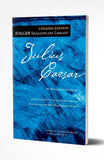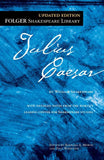Description
In Julius Caesar, Shakespeare imagines the story of the great Roman emperor for all to see (or read). The play showcases the power and responsibility of persuasive rhetoric, and the consequences of being swept away from reason.
Shakespeare may have written Julius Caesar as the first of his plays to be performed at the Globe, in 1599. For it, he turned to a key event in Roman history: Caesar's death at the hands of friends and fellow politicians. Renaissance writers disagreed over the assassination, seeing Brutus, a leading conspirator, as either hero or villain. Shakespeare's play keeps this debate alive.
This edition includes:
- Freshly edited text based on the best early printed version of the play
- Newly revised explanatory notes conveniently placed on pages facing the text of the play
- Scene-by-scene plot summaries
- A key to the play's famous lines and phrases
- An introduction to reading Shakespeare's language
- An essay by a leading Shakespeare scholar providing a modern perspective on the play
- Fresh images from the Folger Shakespeare Library's vast holdings of rare books
- An up-to-date annotated guide to further reading
- Essay by Coppélia Kahn
The Folger Shakespeare Library in Washington, DC, is home to the world's largest collection of Shakespeare's printed works, and a magnet for Shakespeare scholars from around the globe.
| Recommended in Program(s): |
Challenge III |
| Cycle(s): | n/a |
Details
|
Publisher: |
Simon & Schuster |
|
Publication date: |
2009 |
|
Number of pages: |
239 |
|
Weight: |
150 g |
|
Dimensions: |
2.79 cms H x 17.02 cms L x 10.41 cms W |
|
Format: |
Paperback |
|
ISBN: |
0743482743 |
Author
William Shakespeare was born in April 1564 in the town of Stratford-upon-Avon, on the Avon River. When he was eighteen, he married Anne Hathaway. The couple had three children - an older daughter Susanna and twins, Judith and Hamnet. Hamnet, Shakespeare's only son, died in childhood. The bulk of Shakespeare's working life was spent in the theater world of London, where he established himself professionally by the early 1590s. He enjoyed success not only as a playwright and poet, but also as an actor and shareholder in an acting company. Although some think that sometime between 1610 and 1613 Shakespeare retired from the theater and returned home to Stratford, where he died in 1616, others believe that he may have continued to work in London until close to his death.
Barbara A. Mowat is Director of Research emerita at the Folger Shakespeare Library, Consulting Editor of Shakespeare Quarterly, and author of The Dramaturgy of Shakespeare's Romances and of essays on Shakespeare's plays and their editing.
Paul Werstine is Professor of English at the Graduate School and at King's University College at Western University. He is a general editor of the New Variorum Shakespeare and author of Early Modern Playhouse Manuscripts and the Editing of Shakespeare and of many papers and articles on the printing and editing of Shakespeare's plays.




